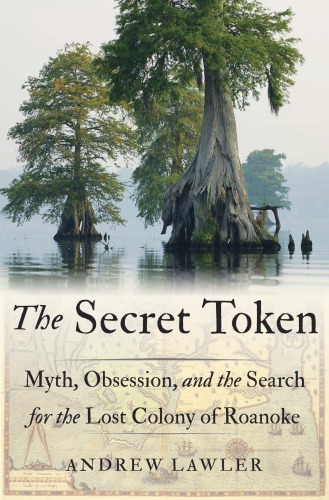
The Secret Token
Myth, Obsession, and the Search for the Lost Colony of Roanoke
کتاب های مرتبط
- اطلاعات
- نقد و بررسی
- دیدگاه کاربران
نقد و بررسی

March 19, 2018
Part detective novel, part historical reckoning, Lawler’s engrossing book traces the story of—and the obsessive search for—the lost colony of Roanoke, the first English settlement in the New World, which disappeared without a trace in 1590, save for a “secret token” carved into a tree: “Croatoan.” Lawler (Why Did the Chicken Cross the World?), a contributing editor for Archaeology magazine, provides detailed historical context about early North American colonization and brings to life the personalities behind the colony, including Walter Raleigh, its powerful backer, and Simão Fernandes, a Portuguese-born pilot often painted as the villain of the expedition. Digging in archives, visiting archeological excavations, and consulting previous leads, Lawler tries to wring a conclusion from the extant evidence: did the settlers die; did they merge with local Native American villages; did they leave the area? In the end, he decides it is more important to ponder why the story of Roanoke still resonates today, leading to a thoughtful and timely discourse about race and identity centered on Virginia Dare, the first English child born in the Americas, and since appropriated by both pro- and anti-immigrant voices. Without solving a long-standing (and likely unsolvable) historical mystery, Lawler makes a strong case for why historical myths matter.

April 15, 2018
Early settlers vanish, spawning centuries of speculation.In 1587, more than 100 men, women, and children landed on Roanoke Island to become the first English settlers in the New World. In 1590, when the group's leader returned from England with supplies, the settlement had disappeared, never to be found again. Lawler (Why Did the Chicken Cross the World?: The Epic Saga of the Bird that Powers Civilization, 2014, etc.), a contributing writer for Science and contributing editor for Archaeology, clearly has been infected with the "Lost Colony syndrome...an urgent and overwhelming need to resolve the question of what happened to the colonists." He creates a vivid picture of the roiling, politically contentious, economically stressed Elizabethan world from which they sailed and a thorough--sometimes needlessly so--recounting of historical, archaeological, and weird theories to explain the disappearance. Besides visiting numerous archaeological digs, historical archives, and libraries in America, Portugal, and Britain and interviewing scores of experts, the author doggedly traces down frauds and hoaxes, no matter how improbable. The Zombie Research Society, he reports, warns of "something sinister still in the ground on Roanoke Island, waiting to be released into a modern population that is more advanced, more connected, but just as unprepared as ever." Something sinister certainly emerged in the settlers' relationship with Native Americans. At first, they "traded peacefully," learned each other's languages, and "formed mutually advantageous alliances." But the English spread deadly disease among tribes with no immunities to Old-World pathogens, decimating communities, and although some leaders tried to treat Native Americans with gentleness, others lashed out against those they considered depraved savages. Native Americans responded with ruthless violence. Massacre is one theory of the settlers' fate; another, equally possible, is assimilation. Most historians believe that the colonists, "if they survived, merged with indigenous society," miscegenation that some found unpalatable. An 18th-century traveler, for example, "recoiled" from the idea that "white women found Indian husbands."In this enjoyable historical adventure, an unsolved mystery reveals violent political and economic rivalries and dire personal struggles.
COPYRIGHT(2018) Kirkus Reviews, ALL RIGHTS RESERVED.

May 15, 2018
The colony of Roanoke, on the banks of modern-day North Carolina, was formed under Sir Walter Raleigh in 1587. Three years later, a rescue mission discovered that the settlement had vanished. Since the disappearance of these 115 English colonists, Roanoke has befuddled archaeologists, induced folklore, and galvanized conspiracy theories. Lawler (Why Did the Chicken Cross the Road?) presents an armchair travelog, historiographical review, and cultural assessment that begins with descriptions of the colony's settlement, archaeological fights for survival, and interactions with the Native Americans. From there, Lawler uses both British and American archives to decode maps and learn as much as possible from scant archaeological evidence of the colony's existence. The final parts of the book analyze the cultural significance of the lost community within a broader historical context, focusing on immigration and the dangers of nativism. VERDICT Lawler compels readers to examine the past in a different light. Accessible and inquisitive, this book is not just for archaeology enthusiasts but for any public or academic library where American history is appreciated.--Keith Klang, Port Washington P.L., NY
Copyright 2018 Library Journal, LLC Used with permission.

May 15, 2018
As Lawler aptly notes: If you look at the maps long enough, Roanoke Island can begin to take on the shape of a question mark. And so, historians have puzzled for centuries over this earliest English settlement in North America. Planted by more than 100 hardy pioneers, it utterly vanished, save for a small and enigmatic carving. Lawler recounts the buildup of English interest in establishing a presence in North America as well as the role of Walter Raleigh and his implacable opposition to the Spanish colonial empire. Lawler examines in detail the facts and the speculations about Roanoke's obliteration as well as continuing obsessions among professional and amateur historians to uncover this greatest of mysteries about the first contacts between Europeans and Native peoples. He casts a critical eye on the speculations over Virginia Dare, first female offspring of the English settlers. This detailed historical inquiry will powerfully intrigue early American history buffs.(Reprinted with permission of Booklist, copyright 2018, American Library Association.)

























دیدگاه کاربران